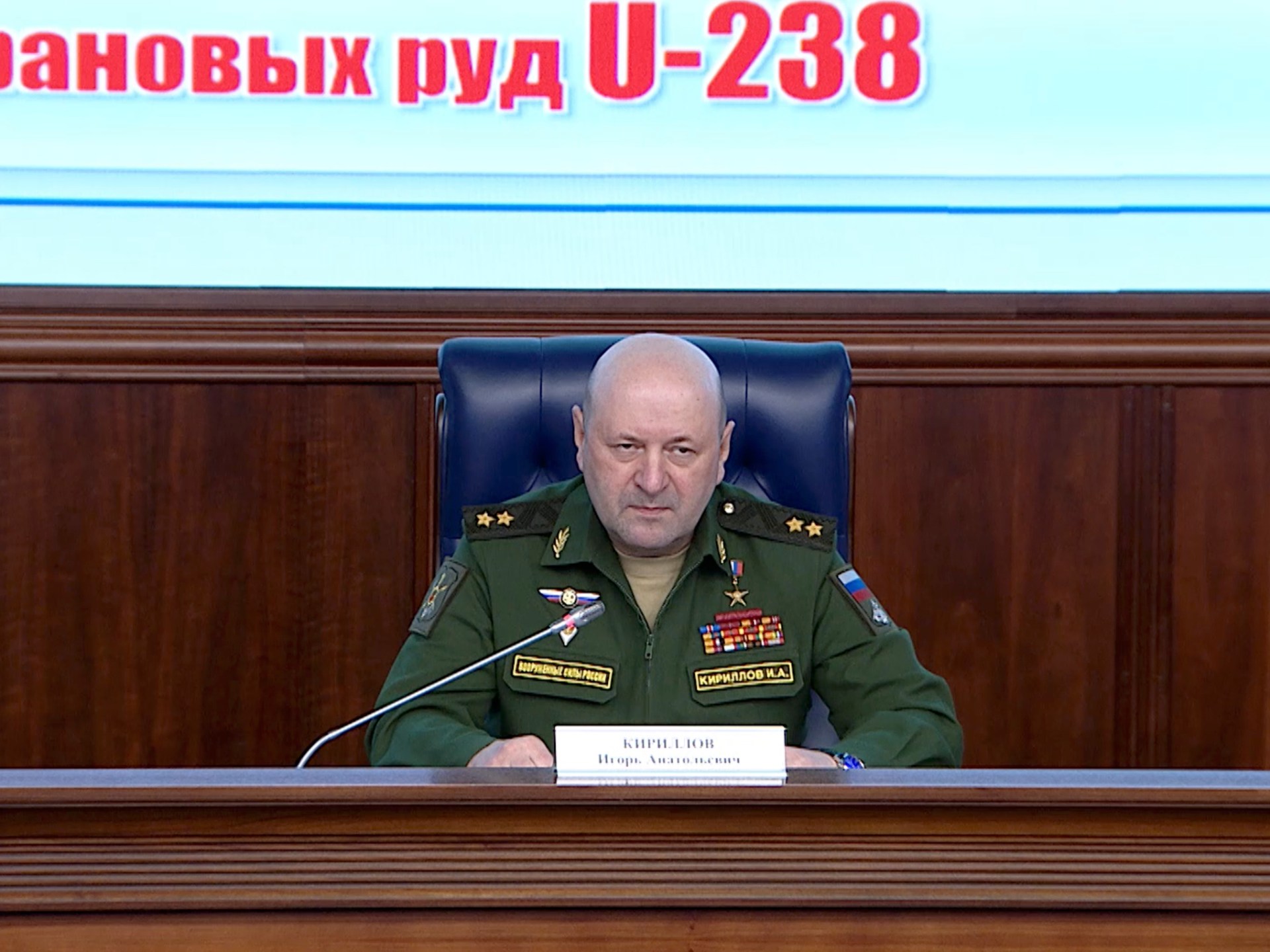Russia said that Ukraine has entered the "final stage" of making the "dirty bomb", an accusation rejected by Kyiv and its Western allies, saying it is only a pretext for escalation, at a time when the Russian army is trying to stop the advance of Ukrainian forces towards Kherson.
"According to the information available to us, two Ukrainian enterprises have specific instructions for making the so-called dirty bomb, and their work has entered the final stage," said the commander of the unit of radioactive materials, chemical and biological products within the Russian army, General Igor Kirillov, on Monday.
A radioactive bomb or "dirty bomb" consists of conventional explosives surrounded by radioactive material intended to be dispersed in dust at the time of the explosion.
"The aim of this provocation is to accuse Russia of using weapons of mass destruction in Ukraine, and thus to launch a massive anti-Russian campaign in the world," Kirilov added, and saw that Kyiv in particular wanted to "frighten the local population and increase the flow of refugees through Europe."
The Russian general warned that the detonation of a radioactive explosive device "inevitably leads to contamination of the area on an area of up to several thousand square metres."
Also, Kirilov accused the United Kingdom of having contacts with Kyiv about "the possibility of Ukraine obtaining technologies for the production of nuclear weapons."
western response
On the other hand, the United States, Britain and France - in a joint statement today - described Moscow's accusations against Ukraine about the "dirty bomb" as false.
The statement said that these allegations are only a "pretext for escalation," and the three countries pledged to continue supporting Ukraine's sovereignty and territorial integrity in the face of what they describe as Russian aggression.
In Berlin, German Defense Minister Christine Lambrecht said her country is cautious and takes any threat of use of nuclear weapons in Ukraine seriously.
She added that the use of "nuclear and dirty weapons would cross red lines."
After #Moscow expressed its concern over #Kyiv's use of radioactive bombs.. Ukrainian Foreign Minister: We don't have "dirty bombs", and Russia accuses others of what it plans to do pic.twitter.com/9qiiqElaO5
- Al Jazeera Channel (@AJArabic) October 24, 2022
For his part, Ukrainian Foreign Minister Dmytro Kuleba said that he had spoken with the head of the International Atomic Energy Agency (IAEA), Rafael Grossi, and formally called on the agency to "urgently send experts to peaceful facilities in Ukraine", that is, facilities that Russia "misleadingly claims" that Ukraine manufactures. "Atomic bomb" in it, as he put it.
He added that Grossi accepted the invitation, and that "unlike Russia, Ukraine has always been and remains transparent, we have nothing to hide."
Kuleba also stated in a tweet on Twitter that he agreed - during a telephone conversation with his American counterpart, Anthony Blinken - that "the Russian disinformation campaign about the dirty bomb may be a pretext for a process that Moscow is preparing for."
Russian frustration
Meanwhile, the Kremlin said today that French President Emmanuel Macron and German Chancellor Olaf Schulz show no desire to participate in mediation in the framework of peace negotiations related to the conflict in Ukraine.
Kremlin spokesman Dmitry Peskov said that "regarding Messrs. Macron and Shultz, they have not shown any desire in the recent period to listen to the position of the Russian side and participate in any mediation efforts."
He added - in statements to reporters - that "Ankara takes a different position from that of Paris and Berlin (...) and has announced its readiness to continue mediation efforts."
The Russian Defense Minister, Sergei Shoigu, discussed developments related to Ukraine in a series of phone calls he had on Sunday with his American, French, British and Turkish counterparts.
Developments in Kherson
On the ground, Russia said that its forces repelled Ukrainian attack attempts in Donetsk, Kharkiv, Kherson and Krasnyi Lyman, and inflicted losses on the attacking forces.
The administration - installed by Russia in Kherson Province (southern Ukraine) - announced the formation of a local militia, saying that all men remaining in the city could join it.
In a notice on Telegram today, the local administration said the men have a chance to join the Kherson Defense Units if they voluntarily choose to remain.
The local administration in the city of Novaya Kakhovka in Kherson also announced that the Ukrainian forces bombed the city with "HIMARS" missiles, and that some of them were intercepted.
On the other hand, the Ukrainian forces ruled out the withdrawal of the Russian army from the city of Kherson, the first major city that had fallen to Russia since the start of the war in Ukraine on February 24.
The head of the intelligence service of the Ukrainian Defense Ministry Kirillo Budanov said that the Russian army was preparing to defend the city.
He added - in statements to the Ukrinska Pravda electronic portal - that "the Russian occupiers are deluding us that they are about to leave Kherson, but in fact they are deploying new military units there."

